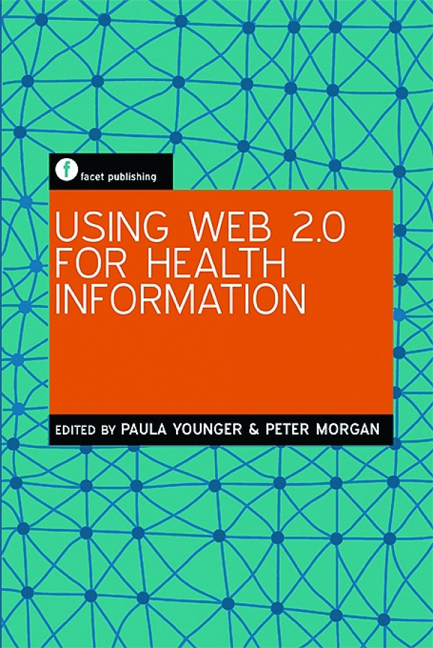Book contents
- Frontmatter
- Contents
- Preface
- Acknowledgements
- Contributors
- Glossary
- Introduction
- Part 1 The basics
- Part 2 Web 2.0 and the implications for health information
- 3 Emerging technologies in health, medical and nursing education
- 4 Supporting learners via Web 2.0
- 5 Supporting research
- 6 Crowdsourcing: the identification of content suitable for the developing world
- 7 Supporting patient needs: an overview of the potential role of Web 2.0 in patient and consumer information
- 8 Some ethical and legal considerations in the use of Web 2.0
- Part 3 Web applications in health information provision: some practical examples
- Part 4 The future
- Index
5 - Supporting research
from Part 2 - Web 2.0 and the implications for health information
Published online by Cambridge University Press: 08 June 2018
- Frontmatter
- Contents
- Preface
- Acknowledgements
- Contributors
- Glossary
- Introduction
- Part 1 The basics
- Part 2 Web 2.0 and the implications for health information
- 3 Emerging technologies in health, medical and nursing education
- 4 Supporting learners via Web 2.0
- 5 Supporting research
- 6 Crowdsourcing: the identification of content suitable for the developing world
- 7 Supporting patient needs: an overview of the potential role of Web 2.0 in patient and consumer information
- 8 Some ethical and legal considerations in the use of Web 2.0
- Part 3 Web applications in health information provision: some practical examples
- Part 4 The future
- Index
Summary
Introduction
The online research environment has changed somewhat dramatically over the decade 2000–10, and researchers are now more connected than ever before both to their fellow researchers and to an unprecedented amount of information. It is now possible to ‘watch’ research as it happens – and in some cases to participate in its development – as one can follow the blogs of well known researchers, receive RSS updates from websites with a research focus, subscribe to podcasts, participate in the creation of wikis and in other collaborative environments, share citations and other bookmarks and join social networks around topic-specific research interests. All of these activities fall under the heading of the so-called Web 2.0, a suite of tools and technologies that has changed the way we interact with and use the web. In an early article on Web 2.0 and medicine, Giustini notes that ‘the more we use, share, and exchange information on the web in a continual loop of analysis and refinement, the more open and creative the platform becomes, hence, the more useful it is in our work’ (Giustini, 2006, 1283).
As in the past, the central problem of conducting good research is to stay abreast of developments within a field of study. Healthcare and biomedicine are areas where new developments occur in rapid succession and leaps in discovery happen. Thus, the need to stay as networked as possible and to be ‘tuned in’ to new developments and discoveries is essential. Web 2.0 tools and technologies offer many options for accomplishing this goal. In addition, the pathway from primary research to knowledge translation to discovery by clinicians has been greatly expedited by these tools. As Hughes et al. note in their 2009 study of the junior physician's use of Web 2.0, ‘although credibility of information was the most cited concern, tools such as Wikipedia or Google are used 3 times more … than PubMed, the “official” best evidence tool introduced in medical school’ (Hughes et al., 2009, 651).
Thus, one must choose wisely in the realm of Web 2.0 and use good information literacy skills in evaluating content, identifying its provenance and placing it in context.
- Type
- Chapter
- Information
- Using Web 2.0 for Health Information , pp. 67 - 72Publisher: FacetPrint publication year: 2011



